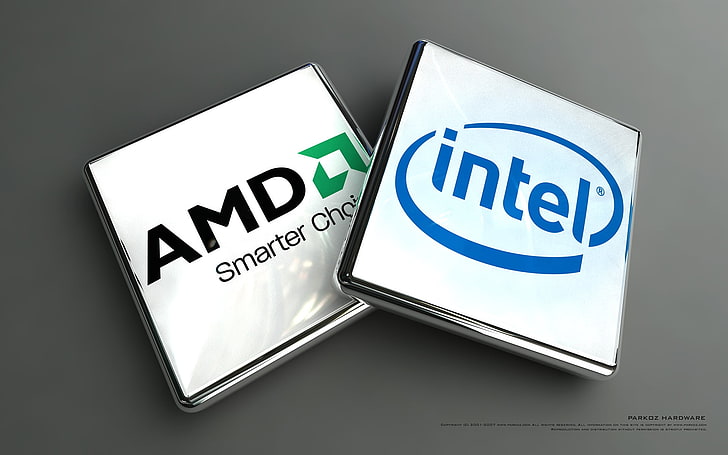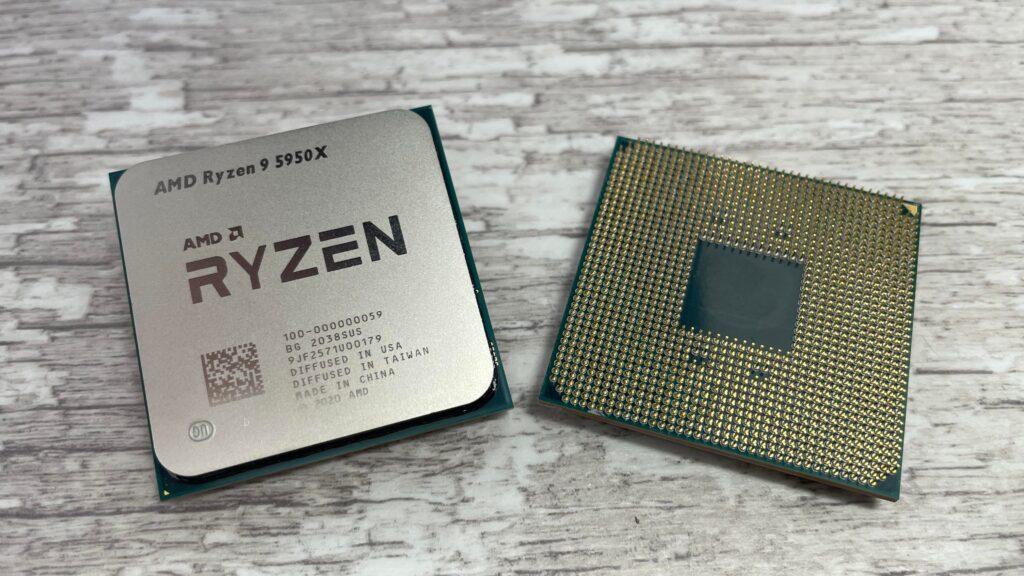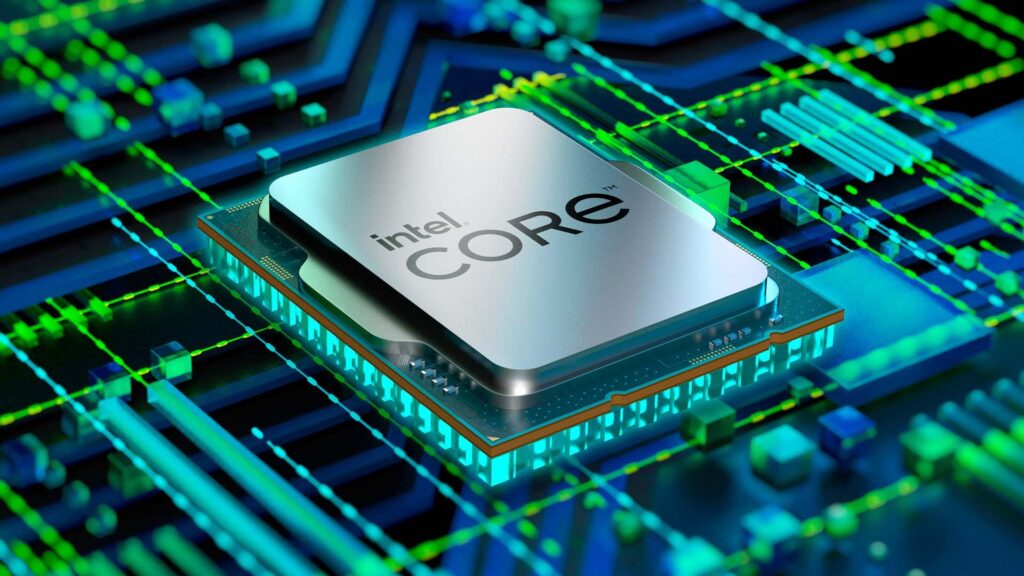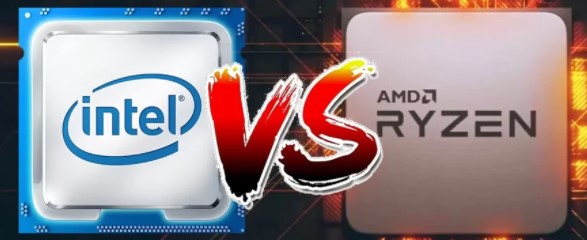In today’s world, there are two main CPU manufacturers that are constantly competing for the top spot in this very lucrative industry: AMD and Intel. Both of these companies feature a number of extremely powerful and reliable components that are commonly used in both low and high-end configurations.
But which of the two offers better streaming performance? I will try to give you a definitive answer to this very complicated question, based on a series of in-house tests aimed to find out which of the two companies holds an edge when it comes to streaming and gaming performance.
Table of Contents
AMD vs Intel
Comparison
AMD vs Intel: How was the comparison made?

While some streamers will use the equipment provided to them by the sponsors, most of them purchase their own hardware, often custom-tailored to fit what they think is the best. As CPU performance is one of the most important parts of a streaming pc, this essential component must be chosen with extreme care.
Knowing this, we have selected a number of key factors that determine how will your CPU affect streaming performance, with the goal of finding the best cpu to stream games with. The first very important factor is the generation that the processor belongs to. With 11 generations of intel core CPUs and 9 generations of AMD ones, it can be easy to get overwhelmed or lost.
Thankfully, the rule of thumb is relatively simple, never is better, and the latest generations of CPUs usually outperform the older ones. I say usually because there are more important factors, such as core count, thread count, clock speed, cooling, and even overclock capacity that can all lead to a performance increase when playing or streaming games, especially if you are running multiple programs in the background at once.
Being aware of all this, I have decided to divide this guide into several parts, comparing AMD and Intel in each of these key areas so that you can see which one will provide you with better performance in your gaming pc. Other characteristics, such as power consumption, overall compatibility, as well as price tag, and integrated graphics are being considered as well in order to make this guide as complete as possible.
AMD vs Intel: Core Count
The most usual assumption is that more cores mean more power, although other factors, such as clock speeds, should be a part of this equation as well. Four cores are considered good for an average, mid-range CPU, but as a streamer, you will want all the performance you can get, meaning that you are realistically looking for a CPU with six cores or more. The is a plethora of both intel CPUs and AMD ones that satisfy this criterion, but which one is better, exactly?
In the past, this question was not that difficult to answer, with intel’s dominance being a well-known fact both inside the industry and among the consumers, but more recently, AMD CPU performance has risen dramatically, with the AMD Ryzen series offering an incredible amount of processing power.
At the absolute high end of the spectrum, AMD Ryzen easily takes the top spot, with its Threadripper boasting an astonishing 64 cores and easily beating even the most powerful Intel Xeon CPUs, as even the one that does have 64 cores, doesn’t have as many threads or as high clock speed and single-core performance.

Nevertheless, we are talking about extreme high-end CPU performance here, with both intel and AMD Ryzen processors mentioned being so powerful that even the most demanding games would find their power completely unnecessary.
In my personal opinion, eight cores are perfectly fine for playing games at high settings while maintaining excellent gaming performance. Because of this, there are a number of both intel core and AMD Ryzen streaming CPUs that are powerful enough to handle gaming and streaming most modern games, even among the previous generation. In the future, however, it seems like AMD Ryzen will be taking the crown when it comes to the number of cores it offers.
AMD vs Intel: Thread count
Thread count and simultaneous multithreading are very important things in even the best CPUs, as each thread the CPU has allows it to deliver the workload more efficiently.
Multi-threaded performance is especially important in CPUs with lover core count, allowing these CPUs to compete with those that have more cores. Typically, you will see two threads per core in most streaming CPU options, with hyperthreading technologies being reserved for the very best of intel core CPUs.
While AMD Ryzen does come with multi-threading options for gaming and streaming of its own, we can easily say that the quality of threading in intel core i9 and never processors vastly outperforms anything AMD CPUs have to offer.

Alder Lake, a new Intel chip technology that is currently taking the market by storm provides all the power you can imagine, easily beating even the most powerful AMD Ryzen chips, even those of the 5000 series.
On the other hand, however, AMD Ryzen boasts a lower price tag, making it far more affordable for those who refuse to invest an entire fortune in their gaming pc but still want great performance.
In my personal opinion, while hyperthreading technology gives intel core CPUs, especially intel core i9, regarded as the fastest on the market, an edge here, it is not worth the difference in price, as even the most demanding games will work just fine on an AMD Ryzen 5 or any better CPU.
AMD vs intel: clock speed and overclocking capacity
When it comes to clock speeds, crucial for single-core performance, and overclocking, the argument can be made in favor of both of these manufacturers. Intel core processors have an advantage in terms of being based on newer technology, with Alder Lake CPUs being mostly capable of supporting DDR5 and PCIe 5.0, something that no AMD Ryzen CPU can boast.
However, the problem is that you are likely going to have to invest in a new motherboard for streaming if you want to take full advantage of this incredible upgrade, as Intel is notorious for locking the majority of its high-end CPU features behind a hefty price tag.
On the other hand, with gaming performance usually being more affected by higher clock speeds than anything else, I believe that AMD Ryzen still outperforms its intel counterparts.
You see, AMD Ryzen CPUs offer much easier access to overclocking than intel does, meaning that your base clock speed is most of the time just that, base, and you can boost clock speed significantly to increase your multi-core performance.
Not to mention the fact that even the lower end AMD Ryzen 5 is perfectly capable of overclocking, which in my opinion cements AMD’s advantage over intel when it comes to its capacity to boost clocks in low- end gaming pcs.
On the other hand, however, those willing to pay for a high-end CPU will get far more out of intel CPUs than they would from AMD ones.
Intel processors that are overclockable often have much more space for said overclocking, and a higher base clock speed at that. Therefore, the advantage in this category belongs to AMD in the lower brackets, while intel processors take the higher ones.
AMD vs Intel: Cooling
The temperature of the CPU can have an incredible amount of influence on its overall gaming performance. Simply put, an overheating CPU will perform at a much lover threshold than a properly cooled one, making cooling a crucial part of any decent CPU, even if we are technically talking about a separate component.
Whether you are using your PC for just gaming or you intent to have great performance while streaming, no matter whether it has six cores, eight cores or even more, you need your CPU to be able to operate at a low enough temperature.
There are several factors that need to be considered when it comes to cooling. First of all, there are two separate types of coolers common with modern CPUs, a liquid cooler and an air cooler. These two water coolers are considered fancier and better performing, but that is not always the case.
For example, there have been complaints by intel core i7 users that the stock coolers their CPUs have come with aren’t even good enough at base clock speed, not to mention overclocking.
While this is somewhat an issue of the past due to intel deciding to increase the power of its coolers after public outrage, the cooling is still nowhere near as good as the one AMD released with its Ryzen CPUs.
Because of this, and because AMD coolers are more likely to handle overclocking well, I have to say that AMD wins this category with a solid advantage, at least for now.
AMD vs Intel power consumption
Power consumption is another crucial factor when it comes to the quality of a certain CPU. The reason behind this is simple: more powerful CPUs tend to use more electricity, and also heat more than the slower ones, leading to a need for a bigger and more efficient cooler and increasing the price of the PC.
Because of this, both AMD and Intel have a long-standing rivalry when it comes to the attempts to reduce the power consumption of their components, as this leads to a significant reduction in the overall price, making them more attractive to the average consumer.
The previous generation of Intel core CPUs, based on Rocket Lake chips, has been (and still is) notorious for its extreme demands for power and therefore heat generation, something that led to the cooling issues we already mentioned. On the other hand, AMD Ryzen has always been known to be less power-hungry, making it a far better choice in this regard.
However, the latest generation of Intel CPUs, Alder Lake, has greatly reduced the power guzzling nature of intel core processors, making them more comparable to their AMD counterparts. Yes, Alder Lake still needs more power than a similar AMD CPU would, but the difference is much lesser than it was in the past.
In the end, AMD is still a clear winner when it comes to power consumption, as even with the most recent upgrades intel still lags behind when it comes to value per watt of utilized power.
AMD vs intel overall compatibility
The vastly different approach between the two manufacturers makes it difficult to make any kind of judgement when it comes to this category of cpu performance.

While AMD has been keeping its CPUs compatible with the AM4 socket for a very long time now, we can safely assume that said socket has reached the end of its life cycle with Zen3 chips, meaning that its incredible backward compatibility with a huge number of motherboards is about to come to a reset with the next generation of CPUs.
Still, if you are looking to add a new CPU for streaming to an already existing configuration in order to boost its gaming performance, you will have a lot more luck with AMD than you would have with intel.
On the other hand, Intel’s approach offers a lot less forward and backward compatibility as they tend to change sockets a lot more often, but with the upside of the technology being quite a bit more modern and efficient than what AMD has to offer.
Once again, this might change with the expected upgrade of the AMD socket in the next generation of CPU’s after Zen3, but for now, Intel does hold the advantage in quality in this area, even if the compatibility is on the side of AMD.
In my personal opinion, AMD holds the advantage when it comes to combining multiple generations of components in a configuration, whereas if you are looking to get the absolute best CPU for gaming and streaming and are willing to invest more to get excellent performance, you will prefer an intel core chip.
AMD vs intel integrated graphics
Integrated graphics are not something usually associated with gaming and streaming, as most of the time you will want to have a dedicated GPU for either of those things.
Still, when operating on a budget or if the graphics in question are particularly impressive, you might get some great performance out of integrated graphics, even when gaming at higher resolutions.
Unfortunately, out of the two manufacturers we are comparing, only one has really entered the minefield that is balancing the CPU with an integrated graphics without making the power consumption and therefore, the need for cooling, too great, and that is Intel.
While a few AMD CPUs offer integrated graphics as a part of their configuration, such solutions are far more common in intel core processors. On the other hand, AMD does offer the most powerful integrated GPU available in two of its APUs, the Ryzen 5 5600G and Ryzen 7 5700G.
The six cores and eight cores CPUs respectively both come with excellent AMD Radeon Vega graphics that beat anything Intel HD graphics can offer at the moment.
So, in the end, Intel has the quantity, while AMD boasts higher quality on the top end of the integrated GPU race, though that is subject to change as both manufacturers continue to release new CPU’s.
In fact, I believe that with the focus Intel has on releasing new integrated GPUs it is only a matter of time before it takes back the crown as it releases a lot more of these than AMD does.
AMD vs Intel: price
There are two entirely separate ways to look at this category of our comparison, and the end result with vary depending on which one you choose.
Are you looking to get the best value out of your money, or is your goal to find which of the two manufacturers offers a lower price for their best CPU?
If your intent is to manage the first, then Intel’s Alder lake chips are the way to go, but only if you do not need a new cooler or a motherboard along with the CPU, and most of the time you will, due to the fact that intel does often doesn’t include a cooler with these CPUs, and its backward compatibility with motherboards is questionable at the best of times.
Otherwise, you might want to look into AMD, which while offering slightly reduced performance at the same price will more likely than not save you the expense of investing in additional components, shifting the scales back into its favor.
On the other hand, AMD has very compelling mid-range CPUs, and also offers far more backward compatibility, not to mention better stock coolers. Because of this, unless you are willing to pay a premium for an Alder Lake chip, you are going to get better value out of an AMD one.
AMD vs Intel: What to look for when purchasing a CPU for streaming?
Number of cores and threads
In my personal opinion, the number of cores and threads is the most important thing to look for in new gaming and streaming CPU, as power multi-core processors will let you run all the programs you need with far more efficiency.
Four cores are considered the minimum at this time, with six or more being preferred. Furthermore, simultaneous multithreading is something you should definitely consider when purchasing a new CPU.
Our guide, fortunately, explains much about the state of the market in this aspect, allowing you to find the best CPU for yourself.
Compatibility
Unless you are looking to buy a whole configuration at once, you are likely going to want a CPU with decent backward compatibility. This usually means going for an AMD CPU, though that might change in the future, as we already mentioned.
Once again, much of the decision will be based on whether you are looking for just a new gaming and streaming CPU or an entirely new PC, with the latter option giving you a lot more space to maneuver.
If you are looking to find out which motherboards are certain chips compatible with, check out the rest of the guide.
Price
With the exception of those streamers whose streams make so much money that the issue of price becomes completely irrelevant when it comes to buying gear, most consumers are likely going to want to get the best value out of their money.
This is easier said than done, with the scales swinging back and forth between the two manufacturers several times per CPU generation.
Luckily for you, I was aware for this when gathering the data to write this guide, providing you with all the information you will need in order to get your new CPU at the lowest possible price.
FAQ
Is AMD or intel better for streaming?
This is a very complicated question, which is why I have written an entire guide in order to address it. Simply put, both manufacturers hold distinct advantages in some aspects, with the rest of them being more or less of a tie.
Your decision will largely depend on how much of the configuration are you willing to invest in at once, as well as the price range you are looking to make your purchase in.
In the end, some of it is a personal preference as well. For more information, check out the rest of the guide, as it contains everything you will need in order to make the best choice for yourself.
Is AMD CPU better for streaming?
Depending on what you are looking for, it might or might not be better than an Intel CPU. The two companies have different priorities and approaches when it comes to designing their components, making it so that there are some stark differences even when it comes to the CPU’s released at roughly the same time.
If you are looking for the absolute highest number of cores, or are, conversely, unwilling to invest in a cooler and a new motherboard alongside your CPU, then an AMD Ryzen chip might be the best for you. Check out the rest of our awesome guide for more details on this!
Are Intel CPUs better for streaming?
This largely depends on what are you looking for in a streaming CPU. If money is not an issue, and you are looking to upgrade your entire configuration at once, the Alder Lake-based Intel chipsets offer the best value for your money.
Likewise, Intel has a lot more options when it comes to integrated graphics, though those are not really recommended for gaming and streaming.
In the end, the question is too complicated to be answered in a few sentences, which is why I have written up a guide containing all the information you are going to need in order to make the right choice between an AMD and an Intel CPU.
